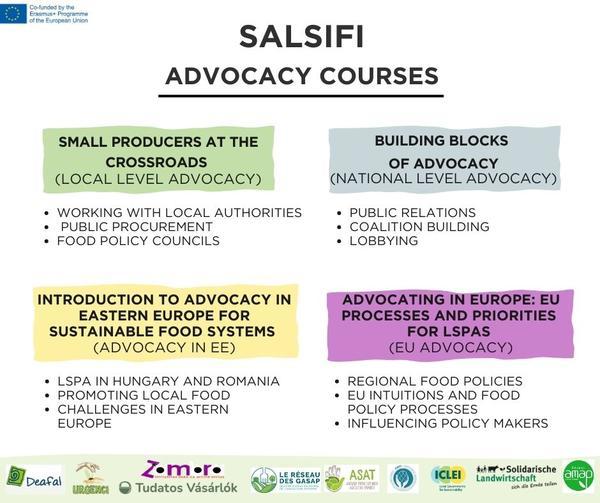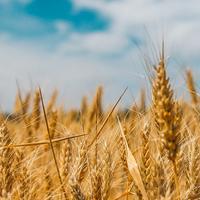SALSIFI: Policy Training for Agroecology Partnerships

In the framework of the SALSIFI project, and building on a partnership of 10 different organisations, four courses have been developed to explore successful partnerships for agroecology. The courses, which will be held in English, will each focus on a specific advocacy topic. They are open to anyone interested, and a certificate will be issued to participants after the training.
Each course consists of an online self-paced online learning module which provides the theoretical base of the course and 2 live sessions where you can exchange with other learners and experts in the field and learn form real-life examples.
Small Producers at the Crossroads (advocacy at local level)
Small food producers are at a crossroads (environmentally, societally and economically) and their choices at this crossroads will affect their resilience. This course explores how we can build bridges between different actors (citizens, public authorities, NGOs and organizations working with local solidarity partnerships and community supported agriculture) in our food systems.
Building Blocks of Advocacy (advocacy at national level)
This module is an introduction to three important fields of advocacy: Public Relations, Coalitions and Lobbying. It serves to expand the knowledge about advocacy for organizations in the sector of agroecology and short food supply chains. The module will help organizations reflect on their own capacities and possibilities with regard to advocacy. The module will also inlcude an exchange with other European organizations to learn from their experiences. The module is designed for interested people working in the field of agroecology and short food supply chains.
Introduction to Advocacy in Eastern Europe for Sustainable Food Systems (Advocacy in Eastern Europe)
Does Eastern Europe have a specific dynamic regarding the development of LSPA (Local Solidarity Partnerships for Agroecology)? Together, let’s find different methods and models to build a more sustainable food system. The module is designed for consumers and producers interested in finding out more information about CSA in Hungary and Romania. It may also be of interest to representatives of local authorities and NGOs engaged in increasing access to locally produced food.
During the training you will learn about LSPA in Hungary and Romania. In the module, you will discover the realities and challenges within different types of LSPAs (e.g., CSA and buying groups). You will also get insight into the activities of the Romanian and Hungarian CSA organisations ASAT and TVE. This module outlines how these organisations have been helping the Romanian and Hungarian CSA movement for years. Finally, you will have the opportunity to interactively get ideas and help promote local food production systems yourself, and exchange experiences with others.
Advocating in Europe: EU Process and Priorities for LSPAs (advocacy at EU level)
Local food policy-making is important and meaningful for strong, resilient, and effective CSA networks, LSPAs, and local food producers.
However, without a clear understanding of the broader, regional food policies and institutions that govern Europe, food producers and their allies will not be able to influence changes at a larger scale. This module introduces participants to the various EU institutions responsible for global food policy. They will also be introduced to the main initiatives and processes right now that influence and affect food producers in Europe. Finally, this module will help participants learn the spaces (both inside and around EU institutions) where they can make impacts on regional food policymakers.
For more information about the courses and to register, please click here. If you have any questions or technical issues, please contact nathalie [dot] markiefka [at] urgenci [dot] net.
About SALSIFI
SALSIFI (Supporting Advanced Learning for Stakeholders Involved in Sustainable Food systems Initiatives) is an Erasmus+ Project aiming to develop and implement an innovative transnational education programme reinforcing the capacity of CSA networks and civil servants at local, regional, national and EU levels to engage in collaborative public food policy-making processes.
About the partnership
The 10 organisations forming the partnership are: AMAP IdF – France, AMPI – Czechia, ASAT – Romania, DEAFAL – Italy, GASAP – Belgium, ICLEI – Germany, Solawi Netzwerk – Germany. TVE – Hungary, URGENCI – France and Zambra – Spain.



